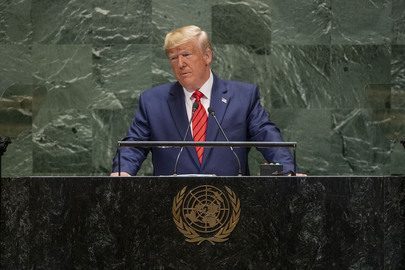An Open Letter to Friends of the United Nations
The only head of state so far committed to physically addressing the opening of the new UN General Assembly session is US President Trump. As the rules for COVID-19 allow only one of the six seats of each country’s delegation in the General Assembly Hall to be filled, there cannot be a ‘big’ audience. As heads of state or government cannot safely fly to New York, there cannot be a ‘high powered’ audience. The last time that Mr. Trump, the 45th President of the US, addressed the General Assembly he was, let’s say, not well received. Why would he like to go back this pandemic-constrained year?
A key element of President Trump’s foreign policy centers on de-constructing the World War II–created international order. Over the past year, the Trump Administration has publicly expressed its concern that the Chinese are successfully assuming a leadership position in the UN system. And in the last weeks, the US lost two key Security Council initiatives on Iran.
President Trump’s primary preoccupation is not international affairs but domestic matters: getting reelected in November. His political base is solidly anti-United Nations and solidly anti-multilateralism.
So why is Mr. Trump scheduled to address the General Assembly in person?
One plausible explanation is that he wants to use the platform to announce that the US will be leaving the United Nations without paying its outstanding financial commitments. Outrageous you say. The US has left or threatened to leave at least six UN system organizations.[1] And President Trump enjoys creating chaos. Such an announcement by the US President would no doubt upset the celebration of the UN’s 75th anniversary taking place this September.
The audience of #45 is his domestic base. They will no doubt like his message, which will produce angst and press statements by mainstream Republicans but no formal legislative response should be expected from them. The Democratic Party is likely to respond that they will renounce the withdrawal as soon as Joe Biden is sworn in as President. They could also point out that it is an illegal action as there is no withdrawal provision in the UN Charter.
Besides casting a dark shadow on the 75th anniversary celebrations, the immediate impacts on the UN of a Trump announcement along the above lines would undermine further the credibility and safety of peacekeeping missions and incentivize the UN leadership to seek new avenues to maintain a meaningful presence in international policy-making through deeper engagement with public-private partnerships and other multistakeholder governance mechanisms. It is also likely to expose the UN to increased pressure to accept multinational corporate donations to meet operating expenses, if other major donors don’t rush in to help with significant amounts that COVID-19 measures make more difficult to find. More broadly, even a surprise threat to withdraw can embolden other anti-democratic, anti-multilateral leaders to make similar pronouncements and weaken joint appeals for humanitarian response to COVID-19, climate action, and Sustainable Development Goals (SDG) implementation.
The start of WWII brought on the collapse of the first universal multilateral body, the League of Nations. A lack of coordination in the response to COVID-19 and the ignored impacts of climate change, both attitudes spearheaded by the Trump Administration, could bring about the collapse of the second universal multilateral body, the United Nations.
A major defensive response would be a strong set of counter-moves by key countries and other key actors in global governance. The international community has only days to formulate such creative counter-moves. Which countries will step up to cover the financial shortfall? Which countries will respond directly to Mr. Trump’s threat to multilateralism? What should be the counter-move by the EU, the G77, the African Union and other regional groupings? What warnings can be shared via global news media and social media to avert or moderate this de-construction of the international system? What will civil society around the world do? And who will take the leadership to organize a public counter-event at UN Plaza and online while #45 will be speaking?
[1] UN system organizations that the Trump Administration has taken or decided to take the US out of, in all or in part: UNESCO, UNFPA, UPU, WHO, UNRWA, and UNFCCC (Paris Agreement).



